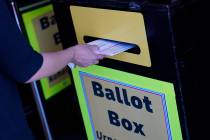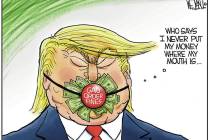Defining the safety net
It would be wonderful if the state could open the new Nevada State Museum. It's a beautiful facility, funded by a 2002 bond issue and built within the sprawling Springs Preserve nature park on Valley View Boulevard.
Unfortunately, the museum is not likely to open anytime soon. Hammered by a lingering recession, Nevada's budget doesn't offer the luxury of hiring enough employees to run the place. I'm a big-time museum lover, but even I can't come to terms with the idea of funding the museum when the state is struggling to find enough money for the most basic of public services.
What are those basic services, you might ask. Of course, this is a matter of considerable debate, but I believe we could make a priority list on which most of us could agree. Most of the essential services fall under the general heading of "the social safety net." This phrase may elicit groans from some conservatives who generically belittle the notion of "entitlements," but when you delve into the details, you can find a lot of common ground.
The 19th century English philosopher Herbert Spencer conceived the idea of "social Darwinism," which decried governmental intervention in social and economic affairs. Spencer essentially applied Charles Darwin's biological theory of evolution to society, making the case for "the survival of the fittest."
But extreme urban poverty, industrial abuses of workers and profound inequalities spurred the Progressive Era, which all but obliterated Spencerian thinking for most of the 20th century. Progressive reforms created government regulations and programs aimed at improving the conditions of life for millions of people. In contrast to Spencer, Progressives argued that government intervention could benefit the evolutionary process.
Progressive Era and Great Depression reforms provided the foundation for the federal, state and local safety nets now in place. While there have been abuses and mistakes in the creation and management of these safety nets, most conservatives would not embrace a return to Spencer's blanket laissez faire philosophy.
So, back to our priority list. Topping the list, I think, would have to be children. It's difficult to imagine even the most ardent conservative making a case for allowing "social Darwinism" to prevail among youngsters victimized or disadvantaged by circumstances beyond their control. Whether it's making sure kids have enough to eat or giving them a reasonable chance to succeed in life by providing a good education, we can agree that some government intervention is justified here.
I would put the mentally ill and mentally disabled at No. 2. These individuals, too, are often vulnerable to circumstances beyond their control, and most require specialized and sustained treatment and guidance. For those who lack the financial means, it's incumbent upon the government to make this treatment available.
Seniors are No. 3 on my list. While many older people have sufficient savings or pension income to provide for themselves in their golden years, others are not so fortunate. Certainly seniors should not be left to suffer or starve. Social Security, Medicare, housing and other programs allow seniors to experience their final years with a degree of comfort and dignity.
No. 4: war veterans. In this country, military service is widely revered, especially service in war zones. It is understood that those who have volunteered to risk their lives to protect our interests abroad should enjoy a high level of respect and support. Unfortunately, the damaging effects of war leave many vets with physical and mental problems that require treatment, and that often result in chronic unemployment and homelessness. Government has a responsibility to take care of men and women who have given so much of themselves in service to the country.
The social safety net must, first and foremost, improve the quality of life for people who fall into these four categories. Republicans and Democrats will debate the fine points of how these safety nets should be constructed, but few on either side would argue for eliminating Social Security, the Veterans Administration, public schools or mental hospitals.
Nevada is in a tough spot. Gov. Brian Sandoval has proposed a $5.8 billion budget for the next two years. That may sound like a lot, but it's really not for a state of 2.7 million people and 110,567 square miles. It means deep cuts to most departments and programs, and siphoning money from counties and cities as well.
When the Legislature convenes next week, its members will regard the governor's budget as a first draft. They will look for ways to reduce cuts to some departments and cut others more deeply. They also will explore methods to increase revenue in order to further reduce the cutting, although Sandoval has unequivocally rejected this approach.
One vital goal of the proceedings must be to ensure the social safety net remains intact at least for the four groups identified above. Sadly, state leaders may not be able to open the new museum, or to adequately fund other projects that make sense in flusher times. But if they can figure out how to maintain our time-honored commitment to our most vulnerable citizens, they will have accomplished the most important task before them.
Geoff Schumacher (gschumacher@reviewjournal.com) is the Review-Journal's director of community publications. His column appears Thursday.























